New facts postpone Russia-Georgia report
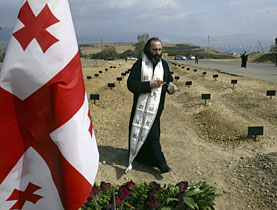
The Swiss ambassador heading a fact-finding mission into the conflict in Georgia says the arrival of new documents has delayed its report by two months.
Heidi Tagliavini told a news conference in Moscow on Wednesday that her Geneva-based group, commissioned by the European Union, would now issue its findings at the end of September.
“Our mandate was to end with a report on July 31 but in view of a number of materials, that were extremely relevant to our fact finding that arrived recently, as late as in the month of July, we requested an extension,” Tagliavini said.
The International Independent Fact Finding Mission into the Conflict in Georgia (IIFFMCG) has investigated the conflict since early 2009.
Both Moscow and Tbilisi accuse each other of triggering the conflict last August when Georgian forces swept into the separatist held pro-Russian region of South Ossetia before being repulsed by Russian troops in a five-day war.
Russia then recognised South Ossetia and Abkhazia as independent states.
Tagliavini said her small team of diplomats and researchers had received good cooperation from all sides in the conflict, including senior officials in Moscow, Tbilisi and in South Ossetia and Abkhazia.
She declined to give any detail on the likely direction of the conclusions of the report, which will be sent to the Swedish EU presidency, the United Nations, and the Organisation for Security and Cooperation in Europe.
Her deputy, German diplomat, Uwe Schramm, said that members of their team had also held talks with officials in Washington.
Fair and objective
“Our goal is to [produce] a fair and objective report,” said Tagliavini, adding that it was an “enormous task” particularly because emotions were still running high on both sides.
The aim of the mission, made up of 15 experts, which include Schramm, as well as a Polish diplomat and former Swiss Defence Minister Samuel Schmid, is to “investigate the origins and the course of the conflict in Georgia”. This, according to the EU mandate, shall be done with regard to international and humanitarian law and human rights.
This could involve probing probable war crimes. Confronted with these immense challenges, Tagliavini used the news conference to play down expectations.
The report, she said, would only include content that could be supported by evidence.
The former head of the UN mission in Georgia said it may never be possible to learn the entire truth, even after further investigations.
Avoid new tensions
Some analysts suspect that the decision to postpone the publication of the report was taken to avoid raising tensions ahead of the first anniversary of the outbreak of fighting on August 8.
The situation in Georgia and the breakaway regions remains fragile. Russia has kept thousands of troops in South Ossetia and Abkhazia, and both sides continue to accuse each other of planning new attacks.
The conflict has put the EU and US in a difficult position. Both Brussels and Washington supported Georgia and its army before the war, in view of Tbilisi’s possible admission to Nato.
Tagliavini expressed hope that the report would at least help all parties to learn from their past mistakes.
The Swiss government has also been active in trying to resolve the dispute. At the request of Moscow and Tbilisi, Bern has – since March – represented Russian interests in Georgia, and Georgian interests in Russia.
swissinfo.ch and agencies, with input from Christian Weisflog
The pro-Moscow enclave of South Ossetia in the Caucasus broke from Georgia as the Soviet Union split apart in the 1990s, but is not internationally recognised.
Georgia began a new offensive to regain control over South Ossetia in August, launching heavy rocket and artillery fire and air strikes. In response, Russia, which has granted passports to most South Ossetians, launched overwhelming artillery shelling and air attacks on Georgian troops.
A preliminary ceasefire was signed on August 12, 2008, although fighting did not stop immediately. Russia recognised the independence of South Ossetia after the fighting. The United Nations refugee agency has estimated the number of those displaced in Georgia and South Ossetia to be up to 30,000.
Swiss diplomat Heidi Tagliavini, a former member of the UN observer mission in Georgia, leads the EU’s investigation into the chain of events in the conflict.
Russian and Georgian negotiators have also been holding a series of talks in Geneva, with the next round scheduled for the middle of September.
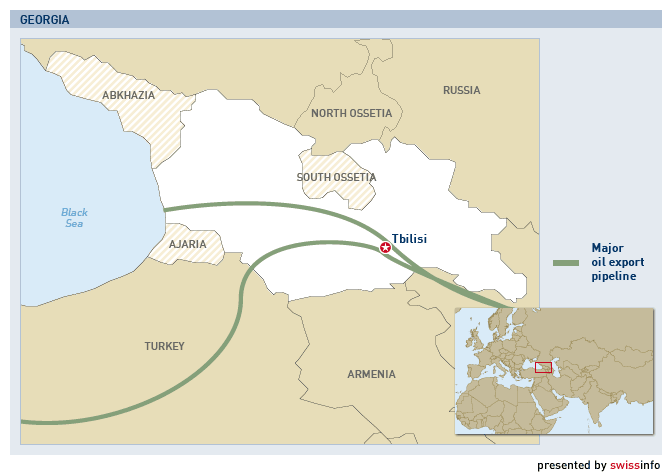

In compliance with the JTI standards
More: SWI swissinfo.ch certified by the Journalism Trust Initiative
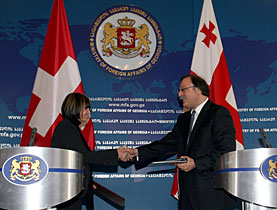
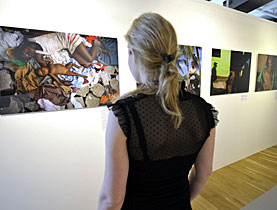
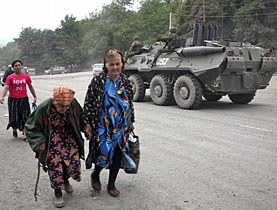
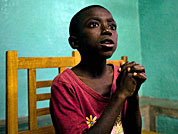
You can find an overview of ongoing debates with our journalists here. Please join us!
If you want to start a conversation about a topic raised in this article or want to report factual errors, email us at english@swissinfo.ch.